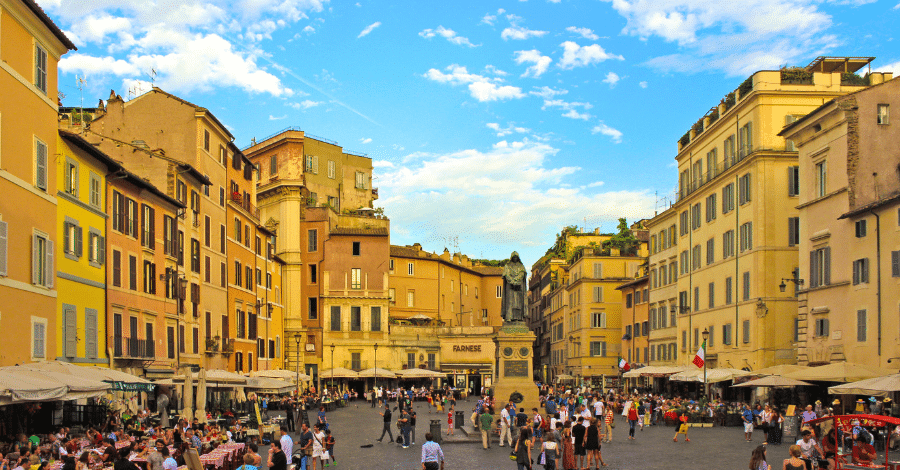Retiring abroad is becoming surprisingly more appealing to many Americans. The State Department says that the current figure could be as high as nine million people – which equates to 12% of the country’s population of retirement age.
The Social Security Administration has also recently published that the number of US citizens who receive their benefits abroad has increased dramatically from 413,000 to 760,000 in the last three years.
Mexico is the most popular destination for Americans, as it offers easy access to the United Sates, but 38% of emigrating Americans are currently relocating to European countries.
The United States being a pretty practical nation, there are a few rather obvious reasons this number is rising – many linked to lifestyle and the cost of living. Here we explore the main reasons that are triggering the move abroad by retiring Americans.
1. Cost of housing
The cost of housing, whether it’s renting or buying a home, is generally more accessible in Europe than in the United States, with some exceptions. Incredibly beautiful locations in Italy, Croatia or Spain can be very cheap, by American standards, to buy a vacation home to which you can retire later on.
The cost of housing in European countries varies tremendously, but apart from in the key cities of London, Zurich and Paris, it is noticeably cheaper to live in most major European cities than in the United States. For example, Berlin, Madrid and Lisbon are surprisingly affordable, although their prices too have started to rise in recent years.

Away from the major cities, renting is overall more affordable in European countries, many of which have strong tenant protection laws that can positively impact both rental prices and housing market dynamics. The monthly rent for a one-bed apartment in a European city can range from €600 – €2,500 depending on the city and the apartment’s location.
On average, renting a two-bedroom apartment in the US is about 60% more expensive than a similar apartment for rent in Spain or Italy, where the average rent is around €1,000.
Central London and Zurich will definitely be at the top end of the range, but in such cities as Prague and Berlin it is possible to find a good-sized one-bed apartment for €1,200 per month.
The average rent for a two bedroom apartment in Athens Greece is €1,120, while the average rent for two-bedroom apartment in the Lisbon region is around €1,400. Choosing to live a little further from a major city center, in smaller towns or in a rural location will mean you definitely get more for your money.
2. General cost of living
The general cost of living in many European countries tends to be lower than in much of the US. The comprehensive social welfare systems found in Europe which include healthcare and subsidized education, significantly reduce expenses for many American families.
Public transport is also much more reliable, efficient and affordable, meaning the need for car ownership is reduced. Many European countries also have higher consumer protection and regulation and this ensures greater stability in prices for essential goods and services.

Food prices in Europe are also lower than in many parts of the United States. In Europe, there is a strong emphasis on local and seasonal produce and there are agricultural subsidies and shorter supply chains and these all positively impact prices.
Much of Europe has extensive farming and food production and this ensures that bread, milk, fresh vegetables and dairy products are all plentiful and affordable. In Portugal, for example, the average grocery bill is 33% less than in the United States.
Cheaper food prices also ensure that dining out in Europe can be more affordable – especially in southern and eastern European countries.
3. Medical costs
Healthcare cost is a major reason some leave the United States. The cost of medical care and medical insurance can be really steep and as people get older it becomes an increasingly important consideration – especially if they have a chronic medical condition or need more than the basic healthcare. Even dental and optical treatments can prove costly.

The healthcare systems in the United States and Europe are significantly different, especially when it comes to costs and access. In the United States, healthcare is largely in the private sector and funded by private insurance, employer-sponsored health plans and government programs such as Medicare and Medicaid.
This system often results in high out-of-pocket expenses for individuals plus high insurance premiums and a wide variation in the cost of medical services.
In sharp contrast, most European countries – such as France and Portugal – offer a healthcare system that everyone can easily access at little or no cost and services are purposefully made to be affordable.
The cost of medication is also significantly lower in Europe. This type of system is funded by government taxes. Many individuals in these European countries also take out additional health insurance to cover them for unexpected medical, private healthcare costs and chronic illness.
In the United States, you can certainly get the latest treatments and often with a shorter waiting time, but this does come with significantly higher costs that can become a financial burden to some individuals.
4. Tax breaks
When it comes to tax, most European countries operate a Double Taxation Agreement (DTA) with the United States which helps Americans relocating to Europe to optimize their tax situation.
Should they still continue working remotely once they have retired in the US, some European countries also operate a Foreign Earned Income Exclusion (FEIE) which allows a certain level of foreign – earned income to be excluded from US taxes.

Portugal, Malta, Italy and Spain all have their own special tax regimes for Americans who become residents there.
5. Political stability
The current political climate in the United States is proving unsettling for many Americans because the outcome will affect so many facets of everyday life in the US. With the elections taking place in 2024, their outcome will affect economic stability, legislative effectiveness, social cohesion, personal planning, global standing and trust in institutions.

The pervasive impact of political uncertainty across these areas contributes to a general sense of unease and insecurity about the future in the United States, which contrasts with the settled political climate in many European countries.
The political stability in the European Union is a major advantage over other popular retirement destinations around the world that may lack in this area, such as Central America or certain parts of Asia for instance.
6. Quality of Life
A slower-paced life focused on well-being rather than professional advancement is one of the top reasons Americans find life in Europe attractive.
In addition to all the above fundamental reasons for making the move abroad, many retired Americans like the chance to travel and discover new areas. European countries are fun to explore as each has its own character and can be easily reached by road, train or air.
A huge bonus to retiring in Europe – if you do not choose a remote location – is that public transportation is much more widely used and generally more affordable in compared to the United States.
There are plenty of cheap daily flights from one EU country to another, allowing you to easily explore all corners of Europe at a fraction of the cost of flying across the Atlantic.
Weather can also play a part in the decision-making – especially as people get older as most appreciate a warmer climate with mild winters. For those who enjoy a variety of sports including cycling, walking, sailing and golf there is the added appeal of relocating somewhere where they can easily pursue their much-loved hobby or maybe take up a new one. An added bonus is that most of these sports cost less in European countries.
Culture also plays a role in the decision-making process as it is can be very attractive to live somewhere within easy reach of museums, art galleries and theatres.
If you enjoy a good social life, you may find retired life lonely and for this reason, many Americans choose bustling European cities like Paris, Amsterdam and Lisbon which all have sizeable American expatriate communities.
Other important ‘must haves’ when choosing where to move is that the area has good internet for keeping in touch with friend and family and also that the chosen country has simple legal requirements regarding long term visas and residency.
It is good to note that a number of European countries – including Spain, Portugal, Greece and Malta – have Golden Visa programmes which enable foreign investors to become permanent citizens.
7. Energy-saving lifestyle
Last, but probably the most impactful on the daily life of a retiree in Europe, are certain lifestyle habits that are conducive to saving energy and leading a healthier life altogether.
Energy prices in the United States have long been lower than they are in Europe. This is mainly because the United States is a large continent with abundant natural resources including natural gas and coal.
Electricity prices in Europe tend to be higher due to a number of factors including higher taxes, stricter environmental regulations and a greater reliance on imported energy.

Gasoline and diesel prices in the US have long been relatively low, mainly due to lower taxes and subsidies on fossil fuels. In contrast, the cost of energy production is higher in Europe because of much stricter environmental regulations that were introduced to reduce the levels of greenhouse gas emissions. The United States has less stringent regulations.
All this has led to Europeans living their lives on an energy-saving mindset that saves money and supports of a healthier lifestyle in the long run. Hanging clothes outside to dry on sunny days rather than turn on the dryer, taking public transportation or walking instead of driving, eating locally and seasonally are all habits engrained in the average European’s daily life routine.
Should you choose a European country for retirement?
Although you may not be planning to swap your home in the United States for one in a European country, it is still important as you reach your retirement age to ask yourself the question whether you are living in the ideal location to enjoy your ‘golden’ years.
The cost of living is definitely a major point to consider as it will impact the amount of ‘disposable income’ you will have. Other questions you should ask yourself is whether your home is in the ideal climate, whether you enjoy the right standard of living for you and what about travel options and healthcare?
If you find yourself uncertain about a number of these factors, it may make sense for you to explore the option of retiring to Europe too.

